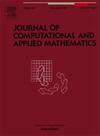Superconvergent results for fractional Volterra integro-differential equations with non-smooth solutions
IF 2.1
2区 数学
Q1 MATHEMATICS, APPLIED
Journal of Computational and Applied Mathematics
Pub Date : 2024-10-26
DOI:10.1016/j.cam.2024.116337
引用次数: 0
Abstract
This article focuses on finding the approximate solutions of fractional Volterra integro-differential equations with non-smooth solutions using the shifted Jacobi spectral Galerkin method (SJSGM) and its iterated version. To deal with the singularity present in the kernel of the transformed weakly singular Volterra integral equation, we convert it into an equivalent weakly singular Fredholm integral equation. We first directly apply our proposed methods to this equivalent transformed equation and obtain improved convergence results by incorporating the singularity of the kernel function into the shifted Jacobi weight function. Further, we introduce a smoothing transformation and discuss the regularity of the transformed solution, and achieve superconvergence results for all . Additionally, we obtain super-convergence results for classical first-order Volterra integro-differential equations. Finally, numerical examples with a comparative study are provided to validate our theoretical results and verify the efficiency of the proposed methods. We show that the convergence rates can be obtained to the desired degree by increasing the value of the smoothing index , where stands for the set of natural numbers.
具有非光滑解的分数 Volterra 积分微分方程的超融合结果
本文的重点是利用移位雅可比谱伽勒金方法(SJSGM)及其迭代版本,寻找具有非光滑解的分数 Volterra 微分方程的近似解。为了处理转换后的弱奇异 Volterra 积分方程内核中存在的奇异性,我们将其转换为等效的弱奇异 Fredholm 积分方程。我们首先将所提出的方法直接应用于这个等效变换方程,并通过将核函数的奇异性纳入移位雅可比权重函数,获得了更好的收敛结果。此外,我们还引入了平滑变换,并讨论了变换解的正则性,在所有 γ∈(0,1)条件下都获得了超收敛结果。此外,我们还获得了经典一阶 Volterra 积分微分方程的超收敛结果。最后,我们提供了一些数值示例并进行了比较研究,以验证我们的理论结果和所提方法的效率。我们证明,通过增加平滑指数ϱ (1<ϱ∈N)(其中 N 代表自然数集)的值,可以获得所需的收敛率。
本文章由计算机程序翻译,如有差异,请以英文原文为准。
求助全文
约1分钟内获得全文
求助全文
来源期刊
CiteScore
5.40
自引率
4.20%
发文量
437
审稿时长
3.0 months
期刊介绍:
The Journal of Computational and Applied Mathematics publishes original papers of high scientific value in all areas of computational and applied mathematics. The main interest of the Journal is in papers that describe and analyze new computational techniques for solving scientific or engineering problems. Also the improved analysis, including the effectiveness and applicability, of existing methods and algorithms is of importance. The computational efficiency (e.g. the convergence, stability, accuracy, ...) should be proved and illustrated by nontrivial numerical examples. Papers describing only variants of existing methods, without adding significant new computational properties are not of interest.
The audience consists of: applied mathematicians, numerical analysts, computational scientists and engineers.

 求助内容:
求助内容: 应助结果提醒方式:
应助结果提醒方式:


